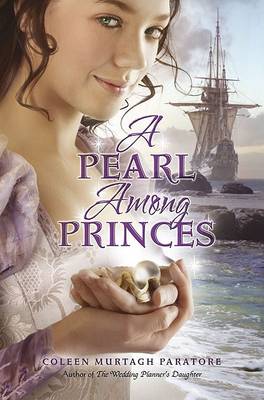Reviewed by Briana @ Pages Unbound on
Miramore, apparently, is an island in our world. The first hint this is so is a random reference to Joan of Arc; eventually Gracepearl tells the readers directly that it is in our world. The location of Miramore, however, is kept a secret from everyone except the princes of the twelve branches who visit each year. Even assuming this story takes place in a time period before technology like satellites or airplanes, this explanation is hard to believe.
And, if this is true, it raises the question of where these princes are from. England? Spain? China? There is no indication that they are from any known part of the world. They do not hail from actual countries, but rather for places named for trees. They are from the houses of Birch, Maple, Elm, Oak, etc. (Which gives the strong impression these princes are all from Europe.) Basically, this entire book would have worked much better if it had been allowed to occur in some unspecified fantasy land.
The characters do not do much to help this flimsy backstory. Their speech is heavily inspired by fantasy, and sadly ends up sounding ridiculous. There are some books where asking, “How go classes?” sounds normal or even epic; A Pearl Among Princes is not one. Part of the trouble is that Gracepearl does not write/speak this way as she narrates this story in first person, which creates a huge disconnect between the speech she uses with the reader and the speech she uses with other characters.
Also, a lot of the characters are just mean. One of the opening scenes shows Gracepearl and her best friends rating the princes on their looks as they disembark their boats. A similar scene of men ranking women would cause outrage (and such actions have caused significant problems in real-world situations). Inverting the genders does not make it any more acceptable. Gracepearl and her friends also have cute little nicknames for the people they dislike. Perhaps the “Muffets” are silly and boy-obsessed and perhaps “Tattlebug” is too nosy; that does not justify name-calling and certainly does not make Gracepearl endearing. (Additionally, Gracepearl’s silly statements like “Flirting is fun!” sometimes make it questionable whether she is even better than the Muffets at all.)
Worst, however, is the entire premise of the book. Gracepearl wants badly to get off the island. She believes marrying a prince is the only way to do so, and is perfectly alright with marrying for little other reason. Sure, she is also interested in looks and picks out the princes who are genuinely nice. The fact remains, however, that she never seems quite sure if she actually loves them. All she wants is a boat. This makes her something of a gold-digger.
This book appears to be an attempt at an original fairytale. There is the whole peasant marrying a prince theme, a mysterious island, and nursery rhymes scattered about that give this impression. Yet the execution is wrong. Gracepearl spends a lot of time discussing whether someone is really a prince (ie. whether he is kind), but she is no princess. The author obviously expects readers to like Gracepearl, but she gives them no reason to do so. I, for one, do not see any particular reason she deserves a happy ending.
Reading updates
- Started reading
- 4 August, 2012: Finished reading
- 4 August, 2012: Reviewed
